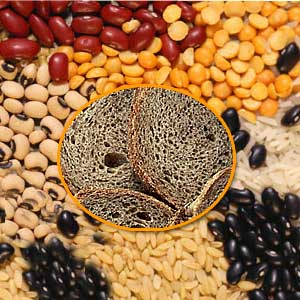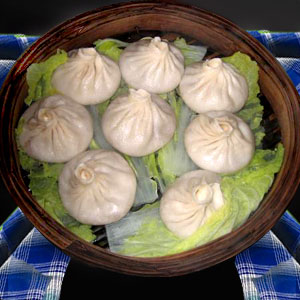Whole Grain Cereal

The Food Pyramid balances itself on a large base of humble cereals along with other plant-based food. Whole grain cereals are rich in complex carbohydrates and supply proteins, phytochemicals and dietary fiber. The benefits of including whole grain cereals into your meal are many. Wholegrain cereals of various kinds are recommended as part of a healthy diet. Find out how you can make simple changes to include whole grain cereal into your dietary routine.
Whole grain Cereal
Whole grain cereals are powerhouses of fiber and nutritive value. Whole grains include wheat, oats, corn, brown rice, barley, bulgur, millet, wild rice and quinoa. Bran or outer layer of a grain is a rich source of niacin, thiamin, riboflavin, magnesium, phosphorus, iron and zinc.
Bran also provides vital fiber. The endosperm or kernel forms the core of the grain. This part contains protein and carbohydrates and has small amounts of vitamins and minerals. The germ is a concentrated source of vitamin E, magnesium, phosphorus, iron, zinc and riboflavin and thiamin.
- Low in saturated fat
- Rich source of polyunsaturated fats, including omega 3 linoleic acid
- Cholesterol free
- High fiber content
- A powerful source of protein
- Abundance of B complex vitamins, including folate
- A good source of iron, magnesium, copper, phosphorus and zinc
- A good source of antioxidants and phytochemicals
In refined cereals, the bran and germ layers are removed during processing. This leads to loss of fiber, folate, phytochemicals and selenium. Refined cereals tend to cause upsurge of blood sugar on account of higher GI. Breakfast in most homes is a bowl of cereal. You can opt for breakfast cereals made of whole grain and enjoy the manifold benefits. Wheat or bran or oatmeal cereals can give you a healthy start to the day. Choose a whole grain bagel and you can be assured of a low-fat breakfast. Go in for multi grain muffins or whole-wheat toast.
Benefits of whole grain cereals
- Phytochemicals such as lignans lower risk of coronary heart disease
- Phytic acid offers benefits to those suffering from diabetes
- Phenolic compounds offer antioxidant benefits
- Saponins and squalene help reduce blood cholesterol
- Whole grain cereals protect against heart disease
- High fiber food made with whole grain cereals are ideal for those on a weight management program
- Due to high fiber content, there is feeling of fullness and digestion takes longer. High fiber also aids in better movement of food through the digestive tract. This reduces chances of colon cancer and diverticulitis.
Whole grain cereals tips
Whole grain cereals must be carefully stored to preserve their aroma and freshness. Keep them in a dry and cool area in an airtight container.
- Opt for wholegrain breads, multi-grain bagels and brown rice. Use wild rice or bulgur or kasha in pilafs and risottos.
- Substitute rolled oats or crushed bran cereal for dry breadcrumbs.
- Look for whole-wheat pasta, pita bread or rye bread.
- Add whole grain cereals in soups, stews and casseroles.
- Snack on baked tortilla chips, popcorn or toasted oat cereal.
- Include chickpeas, kidney beans, split peas and other legumes into your diet.
- Use whole-grain bread or cracker crumbs in meatloaf.
Top of the Page: Whole Grain Cereal
Tags:#whole grain cereal
 Food and Nutrition Facts
Food and Nutrition Facts Chamomile
Parsnip Soup
Dim Sum
Gazpacho Soup
Whole Grain Cereal
Jicama Nutrition
Bok Choy Stir Fry
Chia Seeds Benefits
Teff Nutrition
Kaniwa
Flax Seed
Wheatgrass Benefits
Kelp Benefits
Types of Chili Peppers
Medicinal Benefits of Pomegranate
Arugula Leaves
Maca Root
Pitaya Fruit
Benefits of Celery
Leek
Asparagus Benefits
Oyster Stew
Oyster Mushroom
Lupin Beans
Quinoa
Freekeh
Extra Virgin Olive Oil
Dill Pickle
Sauerkraut
Fat Burning Foods
Nutrition Chart
Food Combining
Calorie Counter
calories ...
Non Alcoholic Beverage
Punch Recipes
Food Label Nutrition
Homemade Sausages
Cooking Steak
Eating on a Budget
Budget Friendly Recipes
Quick Recipes
 Healthy Packed Lunch
Healthy Packed Lunch Overnight Oats Recipes
Eggplant Casserole
Brunch Recipes
Burrito Recipes
Muffin Recipes
Cupcake Frosting
Apple Crisp
Stir Fry Cooking
Seafood Salad Recipe
Cooking Corn on the Cob
Finger Food Recipe
Sandwich Recipe
Bread Stuffing Recipes
Easy Chili Recipes
Picnic Recipes
Edible Mushroom Recipes
Mushroom Soup Recipes
Dip Recipe
Tapas Recipe
Corned Beef Recipe
Canned Salmon Recipe
Tilapia Recipes
Crumb Cake
Flourless Chocolate Cake
Regional Food
 Lasagna Recipe
Lasagna Recipe Peruvian Ceviche
Chinese Food Recipe
Vietnamese Food Recipe
Malaysian Food
Korean Food Recipe
Indian Curry Recipe
Edible Rice Paper
Mexican Food Recipe
Quesadilla
Guacamole Dip
Italian Food Recipe
Spanish Food Recipe
Kosher Food
Falafel Recipe
Tandoori Chicken
Noodles
Canape
Couscous
Meatloaf
Chowder
Gumbo Recipe
Crockpot Recipes
Moroccan Food
Healthy Food
Pre Workout Snack
Matcha Tea
Simple food Swaps to Lose Weight
Foods to Beat Stress
Foods to beat Insomnia
Bone Density Foods
Prebiotic Foods
Kefir Grains
Agave Nectar
Spicy Trail Mix
Pesto Sauce
Homemade Hummus
Crab Cake Sauce
Bamboo Shoots Nutrition
Lemon Grass Plant
Butter Beans Recipes
Loose Green Tea
Seaweed Nutrition
Healthy Food
Low Fat Granola Bar
Steel Cut Oatmeal
Fruit Pizza
Pizza Toppings
Green Smoothie
Healthy Meal Planning
Delicious Mealtime Recipes
Heart Healthy Fats
Healthy Heart Recipe
Healthy Dinner Recipe
Healthy Dessert Recipe
Healthy Fast Food
Healthy Kid Recipe
Probiotic Food
Diabetic Friendly Foods
Fruit Salad Recipe
Bread Pudding
Tofu Recipe
Oat Bran
Broccoli Salad
Avocado Recipe
Iron Rich Food
Brain Foods
Antioxidant Food
Natural Diuretic
Low Fat Cooking Tips
Rice Pilaf Recipe
Low fat Chicken Recipe
Food Tips

Sous Vide Cooking Technique
Natural Sugar Substitute
Stevia Sugar Substitute
Sunflower Seeds Nutrition
Bouquet Garni
Cake Decorating Tips
High Satiety Foods
Thanksgiving Dinner
Safe Food Storage
Frozen Food Storage Tips
Cold Storage Food Tips
Leftover Recipe
Food Pyramid
Dairy Free Food
Microwave Cooking
Food Intolerance
Homemade Ice Cream
Apple Cider Vinegar
Benefits of Honey
Beverage Cooler
Food Poisoning Symptom
Food Allergy Symptom
Food Addiction
Top of the Page: Whole Grain Cereal
Popularity Index: 100,980

